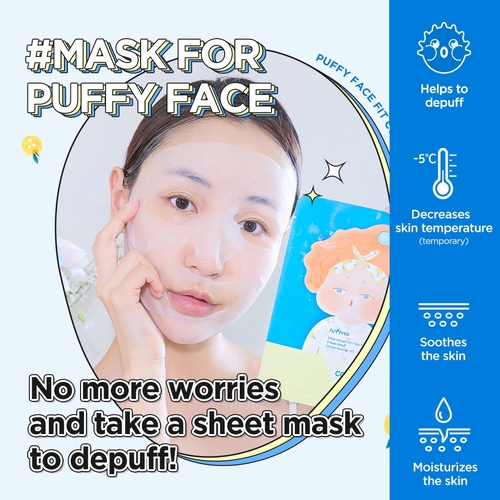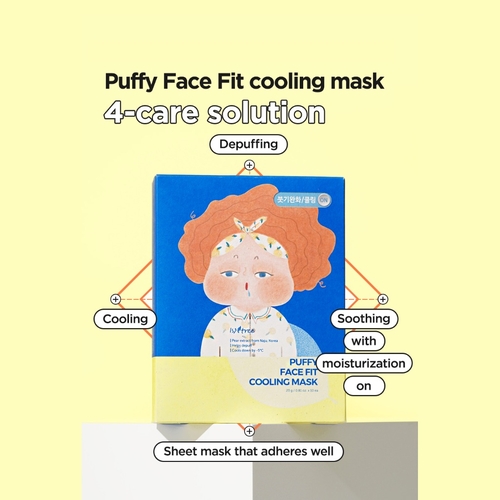Are you tired of waking up with a puffy face and feeling self-conscious about your appearance? You're not alone. Facial swelling, or puffiness, is a common issue that many people face, and finding the best face mask for puffy face can be a game-changer. Whether it's caused by water retention, lack of sleep, or hormonal changes, there are effective solutions to help reduce the appearance of puffiness and restore your skin's natural glow.
Facial masks have become increasingly popular in skincare routines because they target specific skin concerns with powerful ingredients. If you're looking for the best face mask for puffy face, this article will guide you through the science behind facial swelling and the most effective ingredients to combat it. We'll also recommend top-rated products and provide expert tips to help you achieve radiant, smooth skin.
From understanding the causes of puffiness to exploring natural remedies and professional treatments, this comprehensive guide will equip you with everything you need to know about addressing this common skincare issue. Let's dive in and discover how to select the best face mask for your needs.
Read also:Telly Savalas The Iconic Star Who Redefined Television And Cinema
Table of Contents:
- What Causes Puffy Face?
- Top-Rated Face Masks for Puffy Face
- Key Ingredients to Look For
- Natural Remedies for Puffy Face
- Professional Treatments for Facial Swelling
- Expert Tips for Using Face Masks
- Face Mask Comparison
- Frequently Asked Questions
- Benefits of Using Face Masks
- Conclusion
What Causes Puffy Face?
Puffy face is often a result of fluid retention, inflammation, or other underlying factors. Understanding the root cause of your puffiness can help you choose the best face mask for puffy face and address the issue effectively. Below are some common causes:
Water Retention
Water retention occurs when excess fluid builds up in the tissues of your face. This can be due to a high-sodium diet, hormonal fluctuations, or even certain medications. Reducing sodium intake and staying hydrated can help minimize water retention.
Lack of Sleep
Sleep deprivation can lead to puffiness, especially around the eyes. When you don't get enough rest, your body retains more water, resulting in a swollen appearance. Prioritizing quality sleep can significantly improve your skin's condition.
Hormonal Changes
Hormonal fluctuations, such as those experienced during menstruation or menopause, can also contribute to facial swelling. Balancing your hormones through a healthy lifestyle and proper skincare can alleviate this issue.
Top-Rated Face Masks for Puffy Face
When it comes to reducing puffiness, there are several excellent face masks available on the market. Here are some of the best options:
Read also:Juliette Michele Bio A Comprehensive Guide To The Rising Star
1. Kiehl's Powerful-Strength Line-Reducing Concentrate
This vitamin C serum doubles as a mask and helps brighten the skin while reducing puffiness. It contains 10.5% L-Ascorbic Acid, a potent antioxidant that promotes collagen production and evens out skin tone.
2. Origins Clear Improvement Active Charcoal Mask
This detoxifying mask draws out impurities and excess oil, which can contribute to facial swelling. The activated charcoal formula cleanses deeply and leaves the skin feeling refreshed and revitalized.
3. Drunk Elephant T.L.C. Sukari Babyfacial
Formulated with alpha-hydroxy acids (AHAs) and beta-hydroxy acids (BHAs), this exfoliating mask helps reduce inflammation and improve skin texture. It's perfect for those with puffy, dull skin.
Key Ingredients to Look For
When selecting the best face mask for puffy face, pay attention to the ingredients. Here are some of the most effective ones:
- Caffeine: Stimulates circulation and reduces inflammation, making it ideal for combating puffiness.
- Hyaluronic Acid: Hydrates the skin without adding excess water weight, helping to plump and smooth the complexion.
- Vitamin C: Brightens the skin and reduces dark circles and puffiness around the eyes.
- Green Tea Extract: Rich in antioxidants, it soothes irritated skin and reduces swelling.
Natural Remedies for Puffy Face
If you prefer a more natural approach, here are some remedies you can try at home:
Cold Compress
Applying a cold compress to your face can constrict blood vessels and reduce swelling. Simply wrap a few ice cubes in a clean cloth and gently press them against the affected areas for 5-10 minutes.
Cucumber Slices
Cucumbers have natural cooling properties that can help soothe puffy skin. Place chilled cucumber slices over your eyes or cheeks for 15 minutes to reduce inflammation.
Green Tea Bags
Brew two green tea bags and let them cool in the refrigerator. Once chilled, place them over your eyes for 10-15 minutes to reduce puffiness and dark circles.
Professional Treatments for Facial Swelling
In some cases, professional treatments may be necessary to address persistent puffiness. Consider the following options:
Facial Massage
A skilled esthetician can perform lymphatic drainage massage, which helps eliminate excess fluid and reduce swelling. This treatment is especially effective for those with chronic puffiness.
Microneedling
This procedure involves using tiny needles to create micro-injuries in the skin, stimulating collagen production and improving skin texture. It can also help reduce inflammation and puffiness.
Laser Therapy
Laser treatments can target underlying causes of puffiness, such as broken capillaries or excess melanin. Consult with a dermatologist to determine if this option is right for you.
Expert Tips for Using Face Masks
To get the most out of your face mask, follow these expert tips:
- Always cleanse your skin before applying a mask to remove dirt and makeup.
- Apply a thin, even layer of the mask to ensure it penetrates the skin effectively.
- Follow the recommended usage instructions on the product packaging.
- Rinse off the mask with lukewarm water and pat your skin dry with a soft towel.
- Moisturize your skin after using a mask to lock in hydration and protect the skin barrier.
Face Mask Comparison
Here's a quick comparison of some popular face masks for puffy face:
| Product | Key Ingredients | Best For | Price |
|---|---|---|---|
| Kiehl's Powerful-Strength Line-Reducing Concentrate | Vitamin C, Hyaluronic Acid | Brightening, Reducing Puffiness | $68 |
| Origins Clear Improvement Active Charcoal Mask | Activated Charcoal, White Clay | Detoxifying, Reducing Swelling | $24 |
| Drunk Elephant T.L.C. Sukari Babyfacial | AHAs, BHAs | Exfoliating, Anti-Inflammatory | $80 |
Frequently Asked Questions
1. How often should I use a face mask for puffiness?
It depends on the type of mask and your skin's sensitivity. As a general rule, use a face mask 1-2 times per week for best results.
2. Can face masks replace professional treatments?
While face masks can significantly improve puffiness, they may not address underlying issues like hormonal imbalances or medical conditions. Consult with a dermatologist for a comprehensive treatment plan.
3. Are natural remedies as effective as store-bought masks?
Natural remedies can provide temporary relief, but store-bought masks often contain higher concentrations of active ingredients for more lasting results.
Benefits of Using Face Masks
Incorporating face masks into your skincare routine offers numerous benefits:
- Improves skin texture and tone
- Reduces inflammation and puffiness
- Detoxifies and cleanses the skin
- Enhances hydration and moisture retention
- Boosts overall skin health and appearance
Conclusion
Finding the best face mask for puffy face doesn't have to be overwhelming. By understanding the causes of facial swelling and selecting products with effective ingredients, you can achieve smoother, more radiant skin. Remember to incorporate natural remedies, professional treatments, and expert tips into your skincare routine for optimal results.
We encourage you to share your experiences with face masks in the comments below. Have you tried any of the products mentioned in this article? Let us know what worked for you! For more skincare tips and product recommendations, explore our other articles and stay updated on the latest trends in beauty and wellness.
References:


